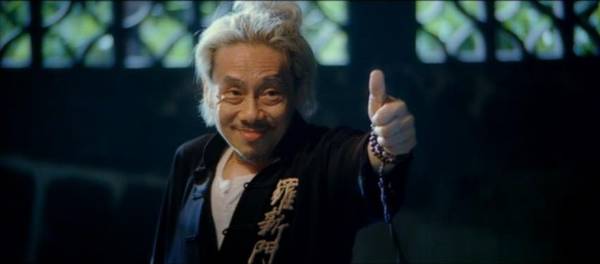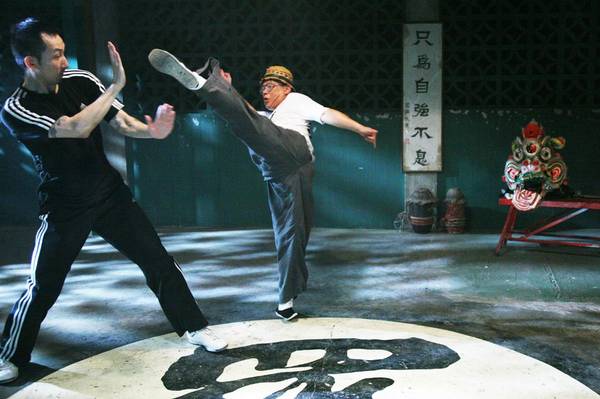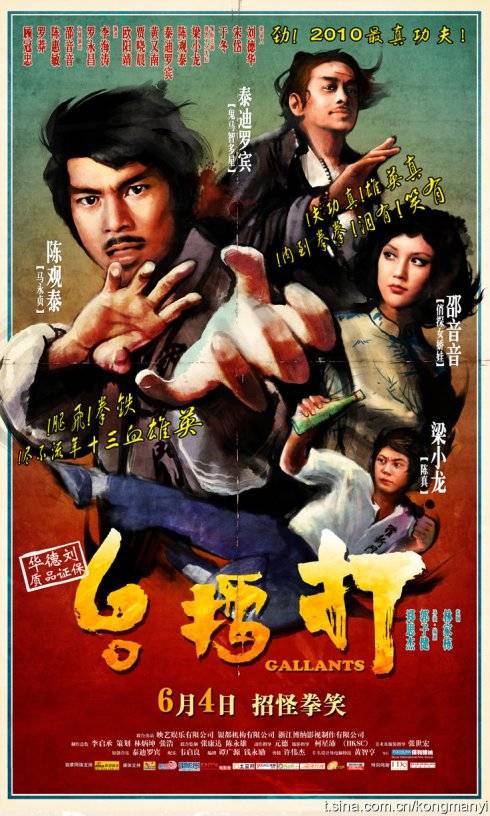 |
Statistics :
11630 Movies
19215 People
1448 Studios
29 Articles
73 Interviews
12 DVD Reviews
32452 Screenshots
3722 Videos
|
|
 |
 |
Concept of Gallants |
1/1 - Page 2 |
 |
 |
 |
 |
 |
|

|
Genesis |
 HKCM: I'd like to be a filmmaker. I would like to know how you started in the filmmaking business and what would be your advice for wannabe directors? HKCM: I'd like to be a filmmaker. I would like to know how you started in the filmmaking business and what would be your advice for wannabe directors? |
| Clement Cheng: I guess the biggest challenge when you make a movie is not the writing. It is to get it financed. It doesn't matter how well you write if no one gives you any money. The writing is the same thing [as I've said before] - trial and error - and just keep working on it.
Initially, 10-12 years ago, there were two stories ideas. The movie wasn't supposed to be about martial arts, it was about music. It was about old people coming together and making music again. They just wanted to perform one last gig. Another concept was to get all the action stars from the 60's, 70's, 80's and 90's, and get the usual good guys to play the bad guys, and the bad guys to play the good guys. The movie was about non-stop fighting, action, and justice. So eventually I combined these two stories and it worked. I just don't know why. |
| |

Teddy Robin Kwan, the grumpy master in Gallants.
|
| |
 Q&A: What was the original inspiration for Gallants ? Q&A: What was the original inspiration for Gallants ? |
| Clement Cheng:
We got to know Teddy Robin Kwan, who was a huge rock star back in the 1960's. He keeps playing every week with his band. He has seven bands, I think. One time he brought us to a jam session with another HK singer, Sam Hui. They are so funny. All these old people gather; some of them are bankers, brokers, doctors. They discuss the stock market and how real estate is going up and down, stuff like that. We thought it would be boring but they are so funny. At one point, one guy struck a chord on his guitar and everybody started playing, without rehearsing. Within four or five minutes, these old people were back in their teens again, and I just wanted to capture that moment. After those five minutes, when the music stopped, they were back talking about the stock market again. That moment is very special to me and I thought I could expand it in a movie. I guess youthfulness is not about how old you are, it's about if you still have that inside. |
| |
 HKCM: You were very much inspired by old 70's kung fu movies. Can you talk about your influence? HKCM: You were very much inspired by old 70's kung fu movies. Can you talk about your influence? |
| Clement Cheng: Everybody has their childhood hero. When I was a kid and my dad brought me to the theater, the first thing that saw was people fighting and I thought it was awesome. That's something that you remember for the rest of your life. And this is so bizarre - when I was four or five years old, he brought me to the theatre to watch people killing each other. I remember it vividly. After I went home, I tried to mimic the action. I jumped around breaking things at home. Of course he regretted bringing me along. I didn't know what the story was about but thought it was so cool - kicking people's asses. I couldn't do it at school because it was really strict; you couldn't even talk at school.
The reason why I am into it and am doing it is because it [kung fu] is a special genre. It was created in HK by HK cinema. I thought, “If I was to make a movie in HK, let's make something relevant.” Everybody is saying the HK cinema industry is dying. The first day I was working in the movie industry in HK, people were telling me I was so unlucky. “It's too late, the peak is over. You are not going to earn money. You'll have to do something else.” They were saying it in a good way, like they were trying to help. And they were saying this was not a good place anymore. I guess the only reason I had a chance to direct movies is because all the big name directors thought there was no market anymore in HK, and they all went up north to make movies in China. Like I said, I go the other way.
|
| |

Fighting the old school style, in Gallants
|
| |
HOW THE MOVIE WAS DEVELOPED
|
 HKCM: Gallants was made in 18 days at the cost of HKD 5 million. What challenges did you face on set on a daily basis? HKCM: Gallants was made in 18 days at the cost of HKD 5 million. What challenges did you face on set on a daily basis? |
| Clement Cheng: I am going to give you a bit of the movie background. After Mr. Lau thought it was good and said “Let's make the movie”, they had the accountant come up with the budget. It was probably HKD 12 million, which is probably a million pounds. And then they thought they couldn't come up with all the money themselves, so they proposed a HK-China co-production and we'd have enough money to make the movie. We finished the script and sent it to the censors to check. It didn't pass. They said “You cannot do this, you cannot do that.” So we fixed it and sent it again.
The process took eight months. We kept changing the script again and again and again. They said we couldn't have the local HK elements in it because it was supposed to be a Chinese film now. We couldn't have any bad guys because it looked like triads. You know that's crazy, but we did it anyway. At the end, after eight months, there was just one dialogue line they felt offended by: at the very end, a line about what kung fu really means. My partner Derek Kwok and I wrote the whole script again, and thought it was nothing [like] we had come up with at the beginning. And if we were going to make these compromises, we were going to do a shit movie.
It might not be bad but it's something we really didn't want to do. Even though we waited for ten years to get people to invest in it, we thought, “F*@! it, we're not going to do this.” We just quit. We discussed it for two or three days, and it was a really hard decision. We kind of regretted it the day after we told Mr. Lau. But then it was all good, and we held up our own dignity, I think. That was the only thing we had left at the end.
Three months later, Mr. Lau got someone to call and ask us if we still wanted to make the movie, but with one third of the budget. We were totally shocked. It was supposed to be an action film. For no reason at all, and with exactly the same gut feeling, we said “Okay, let's do this.” We just didn't know how we were going to do it. When we got off the phone, we called people who did a lot of action and martial arts movies. And they said, “You'd better call back and say you won't be able to do it.”

Clement Cheng and Derek Kwok on the set of Gallants.
We only had 18 days to shoot and a limited budget. The cheapest and shittiest martial arts films take 25 to 30 days just to shoot the action scenes. We only had five days to shoot the action scenes and 18 days to shoot the whole movie. We didn't know how to do it. We just persevered. Many people chipped in and helped, especially the actors. They really, really helped. We had two cameras on set everyday but we only had one set of lenses, one set of tracks and one director of photography.
The assistant was like a second director of photography who worked the camera. We were shooting simultaneously. Derek shot a scene, and I was shooting a scene too. We didn't know what the other guy was shooting but because we've been working [together] for so long, we trust each other and we could put the two things together. The hardest part was not on us but actually on the actors. They were wanted here and there. And Derek and I were constantly fighting over the lens. “Where is my 50 lens? Where is my 10 lens?" It was chaotic and hard work, and we fought everyday. And those are the days I'll never forget. We had so much fun afterwards. |
| |
 HKCM: It's probably like you actually shot in 36 days, like 18 days times two. HKCM: It's probably like you actually shot in 36 days, like 18 days times two.
|
| Clement Cheng: Maybe… But no. We only had an extra camera, that's it. We didn't have to pay extra people. We were lucky. If we weren't doing it with two directors, I don't know, it might not have been made. It was just fate, I guess. |
| |
 Masterclass: It took 10 years to make the film. Did the investor or distributor require changes and take control of the film? Masterclass: It took 10 years to make the film. Did the investor or distributor require changes and take control of the film?
|
| Clement Cheng: I am just happy that it got made. I didn't care, I gave up everything. The only thing I asked for was to do my own version of the poster. I think it can make or break a movie. When you make a movie, you want to have a poster to hang up. Every time you look at it, you enjoy it and are proud of it. As you know, movie posters in HK are really shitty. They are just collages of big stars and there is nothing. So that's what I really asked for: I asked [to design] the Chinese version of it. I got some painters to paint the faces of the [film's] old characters, but in their youth. To me, this movie is not about old people. It's about youth, youthfulness. Whenever you are in your teens, or your 20's or your 50's or your 60's, you can still have youth. That what the idea of painting them in their prime - oil painting actually - was about.

Poster of Gallants. |
|
|
| |
 |
|
|
Page :
1
2
3
4
5
6
7
8
9
10
Top
|
|
|
|
|
|
|
 |
